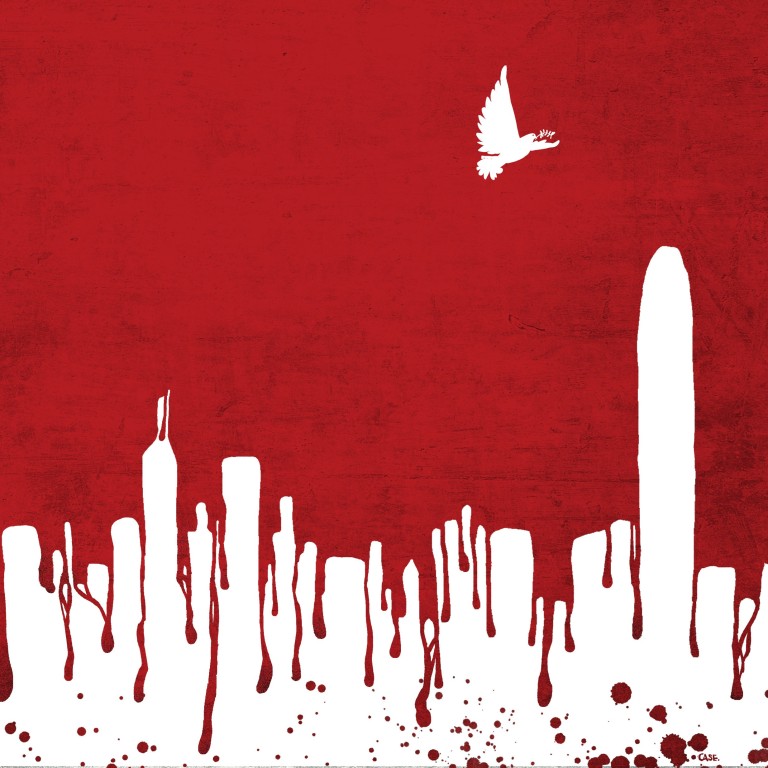The peaceful efforts of hundreds of thousands of Hongkongers dissipate quickly, with the eruptions of violence that now inevitably follow. What’s more, it is no longer a question of whether
protesters or police are using violence. The attacks in
Yuen Long on Sunday make clear that violence as a tactic can be used by anyone. When violence is the norm, when it is legitimated as a political tactic, it cannot be controlled.
The protesters have tried to pin the violence on the police alone, to the point of coming down hard on the University of Hong Kong vice-chancellor for
issuing a statement about protester violence. The reality, however, is that there is violence on both sides, and now from within the community too. Violence has been legitimated as a political tool, to the extent that
lethal explosives have been unearthed in Tsuen Wan. There are no innocents here – violence begets violence.
Hong Kong is not unique in this regard. Social movements often have to address the issue of using violence as a means to achieve political goals. Some, such as those led by Martin Luther King and Mahatma Gandhi, avoided violence and practised civil disobedience – disobeying the law and accepting the consequences of doing so.
Others, like
Nelson Mandela, saw no choice but to use violent tactics to fight against a brutal apartheid regime. Context and conditions govern the use of violence as a political tool and an assessment of what is needed to win. But what are the conditions in Hong Kong that might justify the use of violence?
The
extradition bill has been pronounced
“dead”, and while the administration refuses to bury it, there is no chance of it being resurrected. The violence, however, is not about dead legislation, even though peaceful protesters continue to push for the bill’s burial. The violence is about China, or more accurately, the immense
anti-China sentiment reflected most strongly in the pro-independence movement.
Having
suppressed the movement in multiple ways by using the immense power of the state, Chief Executive Carrie Lam Cheng Yuet-ngor is now living with the consequences. With the
expulsion of members of the Legislative Council, the
jailing of Occupy protesters, the
banning of pro-independence candidates from election to public office and the success of the
“co-location” arrangement for West Kowloon, she might have got the impression that she could also push the extradition bill forward. Yet repression is only ever a temporary solution, even in the most brutal of regimes, which Hong Kong is not.
Eventually what is repressed will rise again to the surface, and the extradition bill has provided just such an opportunity. What it has unleashed is rampant anti-China sentiment, evidenced by the vandalism in the
Legislative Council, the attack on the
central government’s liaison office, and the consistent opposition to
mainland tourists. These campaigns are not led by disaffected youngsters, as the current narrative so often suggests, but by young adults with a clear and determined political agenda that includes violence and intimidation.
Repression must be recognised as the root cause of this violence. If issues and ideas
can’t be discussed openly, then they will be discussed in the echo chambers of social media, and radical solutions will be developed
away from the public glare. This is what we are witnessing now – plans hatched in private being given public expression in violent and confrontational terms.
On balance, it seems violent flanks of resistance campaigns are rarely helpful in achieving the main goals of any campaign. Often these campaigns succeed despite the violence. Of course, this assessment can be challenged; but scholars who have examined these aspects of social movements have looked broadly at examples. They have concluded that even in South Africa, it was peaceful resistance, not armed struggle, that won the day.
Violence might give a kind of emotional release, but it will not win the day. It will only beget more violence, as we have seen in recent weeks, whether from police, within the community or from even more radical forms of protest action.
Yet Hong Kong cannot continue in this spiral. The government has
rejected the request for an
independent inquiry. Nevertheless, it desperately needs a platform to facilitate dialogue, because the divisions within Hong Kong society are almost beyond breaking point.
The future cannot be about retribution, as it was after
Occupy Central. It is clear that authoritarian solutions do not work in this city. Repression simply drives dissent underground, the repercussions of which the city is now dealing with. What Hong Kong needs is a
truth and reconciliation commission, similar to that established by Mandela at the end of apartheid in South Africa. Its purpose was to bring the nation together.
Mandela, of course, had won a long drawn-out campaign and was in a position to extend the hand of peace. This is exactly what needs to happen in Hong Kong now, and it must include both sides.
Peace and reconciliation are the only ways ahead if the city’s future is not to be one of continued gratuitous violence. Such violence helps no one, wins nothing and does damage not just to the reputation of the city, but to its soul. Peace and reconciliation must be given a chance.
Kerry Kennedy is professor emeritus and adviser (academic development) at The Education University of Hong Kong
This article appeared in the South China Morning Post print edition as: Give peace a chance


